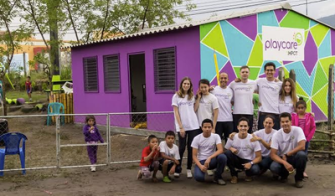A team of young entrepreneurs from around the globe won $1 million Saturday in a contest put on by Swedish billionaire Bertil Hult and the Clinton Global Initiative that challenged teams to create a socially minded business that addressed the issue of early education for children living in “urban slums” in developing countries.

Early education in urban slums—populous, but unincorporated areas in or near major cities in the developing world—usually consists of one mother taking care of several children in her home while the other mothers work, said Taylor Scobbie, CEO and co-founder of the winning team. To solve that, his team has proposed a crowd investment model that will provide such women with the capital, facility, and training they need to open a larger early-care center guided by an age-appropriate academic curriculum. Their idea won out over more than 20,000 others submitted this year.
“This is an evolution in charity,” Scobbie said of the model his group, IMPCT, is debuting. “You know exactly what you’re investing in and who you’re investing for.”
Investors will stay in touch with the women they are funding throughout the project, as will the IMPCT team. Scobbie likened the on-the-ground centers to a franchise model. Each woman running a center will be effectively running her own small business, but will have the support and quality-control guidelines of a larger organization.
In the one Central American city where the first center has been built and launched, Scobbie said the leader of the center used to charge $40 per child per month and would make a profit, which equated to her salary, of $90. Now, with more children, she can charge the same per child, but provide a meal, a qualified teacher and a curriculum. She’ll also be making a salary of $180 a month, plus 25 percent of any additional profit. Another 25 percent of her profit will go back to IMPCT, and the rest will go to her crowd investors.
“We’re for-profit because people are interested in investing in us,” said Scobbie. “But we don’t act like a for-profit in that we don’t give dividends back to our investors. The idea is that if the business model is sustainable and you don’t have to take donations, it will allow you to do more good over time.”
Scobbie and his team hope their model will help 3 million to 4 million children receive improved early-education services by 2020.
This year’s award was the fifth Hult prize to be handed out. Previous prizes have been in areas such as health care, clean energy, and technology access. Winning entries must layout scalable, socially conscious business plans.
Next year’s challenge is to come up with a business plan to address overcrowded urban spaces, “by better connecting people, goods, service and capital.”
Photo: The IMPCT team poses with local children in front of the first center built with their crowd-investing model in the La Cuchilla area of San Salvador, El Salvador. Photo courtesy, Taylor Scobbie.